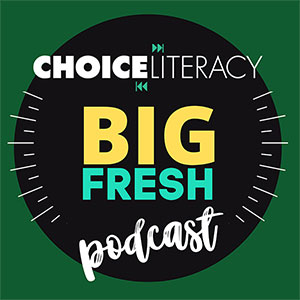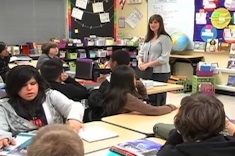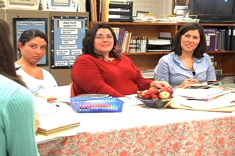Kelly Gallagher is the author of numerous bestselling books for high school teachers, including Reading Reasons and Readicide
. In this podcast with Franki Sibberson, he explains the concept of Readicide
, and what we need to do to build a desire for reading in students. You can learn more about Kelly's work at his website, http://www.kellygallagher.org/
A full transcript of the podcast is available below the player.


Franki Sibberson: Kelly, you coined the term "readicide" several years ago. Can you tell us about the idea of readicide and how you came to that word?
Kelly Gallagher: Well, the word was coined basically out of something I'd written in a previous book, my book Deeper Reading, where in that book I talk about assumicide, which is the death of a lesson that comes when you assume kids know stuff. I was actually having lunch one day with Smokey Daniels – Smokey, of course, has written a number of books including Literature Circles
– and we were kind of kicking around this idea of assumicide, and I was writing Readicide
at the time. It was the first book I've actually written that deep into a book without having a title for it.
And I don't know, somehow out of that little lunchtime conversation between Smokey and me, the term readicide sort of came to the surface. I can't really remember if he coined it, and he can't remember if I coined it, but from out of that conversation, we were talking about this idea that reading seems to be dying in our classrooms.
Franki Sibberson: Are you seeing the impact of readicide on your secondary students differently? Have you noticed big differences over the last several years?
Kelly Gallagher: I have. I have noticed a lot less desire to read. I have a lot fewer students who have really adopted reading, a habit. This year I'm teaching ninth grade and as we are having this interview I am in the last two weeks of school, and so for the last two days all my kids are working on portfolios. I have been calling them up and conferencing with them about their reading over the year, and just the amount of reading that they're doing, and the gymnastics that I have to go through to get them to even entertain the idea that reading should be something pleasureful, something that we do as a life-long pursuit, is getting more difficult every year.
Franki Sibberson: Do you see this as a secondary issue, a K-5 issue? When do you think it starts?
Kelly Gallagher: Well, I think a lot of that depends on the teacher. I think it could be a K-3 issue if the K-3 teachers are much more concerned with moving kids in the direction of the tests rather than moving kids in the direction of being life-long readers. But my gut feeling is that most early elementary school teachers are pretty good about trying to instill the desire to read into our kids. If you look at a lot of the studies, most of that drop-off of reading, the most precipitous point is usually around age 13.
So when they get up into middle school, and the day gets very choppy, and they're seeing a number of different teachers, they're changing themselves in that in-between stage between being children and adolescents, that seems to be where, I think, readicide really intensifies, and I don't think it's an accident that the place where it intensifies is also the place, I think, where the testing pressures begin to intensify. You look at middle school and high school, I think the problem there is that the teachers are so being held to these tests, that the idea of recreational reading has been not put on the back burner but completely taken off the stove.
So it can be a K-12 issue, but my sense is it's much more of an upper elementary, junior high/high school phenomenon. A lot of my kids who don't read today, they saw themselves as readers when they were in the third grade or fourth grade or fifth grade. Something's kind of happened between then and now.
Franki Sibberson: That's interesting. So you have been speaking everywhere, all over the world, about Readicide. What responses are you getting from teachers, politicians, administrators, parents?
Kelly Gallagher: Well, maybe I'm speaking to the wrong audiences because it's almost overwhelmingly positive, very welcoming. I've kind of thought about this tour that I've been on, talking about Readicide, as maybe changing the name of that to Preaching-To-The-Choir tour. But I think people who are in the classroom, I think teachers intuitively know something is wrong, and I know they think, in their gut, that this all-out quest to prepare kids for tests is having sort of long-term negative effect on kids' desire to read.
I've had a lot of people talk to me about sharing the book with administrators. I've had people ask me, have I shared with lawmakers, and I have. I even sent one to Arnie Duncan and got a nice form reply letter. Yeah, I think it was time for the message, and I think that's one of the reasons why that book has been so well-received.
Franki Sibberson: So a single teacher in a school – and this is such a big issue – what can a single teacher who wants to make a difference in his or her school do?
Kelly Gallagher: Well, I think a lot of that depends on the culture of the school. I think it depends on the attitude of the administration, at both the school level and the district level. I think there are different levels to that question. Of course the most obvious answer to that question is you close your door and you do what you think is best for your kids, and you put books in their hands, and you model that you, yourself, as the teacher is a reader, and it's not just something we do to prepare for Friday's quiz but it's something that we do because we're inquisitive people and we want to understand as much of the world as we can.
The problem I see when I'm out there talking with teachers is this idea that it's kind of seen as an either-or proposition. Either you prepare your kids for the tests or you enable more recreational kind of reading to go on. I don't buy the premise. I don't think it's an either-or. I think the kids who read the most will score well on the tests. I think if you teach kids to read well, the tests will take care of themselves, but if you only teach kids to take tests, they may read well on that state assessment but I don't know that they'll be reading 10 or 20 years from now.
Of course, we live in an age where kids have a lot more distractions than they used to, as well. My concern, in talking to secondary schools – here's where I think primary schools do a much better job than secondary schools. You walk into primary schools, you walk into a second grade classroom, a lot of classrooms, and they have kids surrounded by books. They have classroom libraries. But you walk into a high school, boy, the classroom libraries are few and far between. Sometimes I ask, in some of the talks that I give with teachers, "How many of you have recently sat in a staff development meeting or a teacher meeting where the question of 'Do our kids have enough reading, high interest, recreational reading choices surrounding them? Are our kids in a book flood zone at any time during the day?'" and I have teachers laugh at me.
Those questions are very rarely asked in most schools, and it just seems kind of sad to me that our schools have become a place where you don't find the kind of books kids want to read outside of school. I teach in a community that doesn't have a bookstore, it doesn't have a local library, and my kids come from print-poor environment at home. So if I don't put good books in their hands, when and where is that going to happen? It saddens me and it still shocks me how little attention that's being given in a lot of schools.
Franki Sibberson: That would make a big difference, just having books.
Kelly Gallagher: Absolutely. When I first started teaching, I didn't have a single book in my room, and I had a hard time getting kids to read. Now, as we're recording this, I'm actually sitting at my desk in my classroom, room 301 in Magnolia High in California, and I'm staring across the room and I have about 2,500 books in my room. When you put good books in your room, a lot of kids will read them. It's that access. It's a political issue. It's an economic issue. It's not an IQ issue. It's an access-to-text issue, and for some reason I think secondary teachers lose sight of that.
Franki Sibberson: I heard you speak in February and you really had some numbers to go with this either-or thing that you're talking about, that it's not either we prepare them for the test or we support life-long readers. You've talked a lot about this, but how do you suggest teachers really focus more on supporting life-long readers and deep reading but still know that their kids will do well on the tests? How do you balance that time, when you have such limited time in the classroom?
Kelly Gallagher: Well, my kids' test scores from last year were pretty good. They were good enough for my district to come down and peek around to see what I was doing in my classroom, but I did very little test prep with my kids. What I do in front of my kids, though, is I do model what good readers do. I do model how readers handle confusion. I'm the best reader in my room, and if teachers listening to this podcast are the best readers in their room, I think they need to stand in front of their class a little bit and model some of those behaviors that we do, when we are confronted with confusion. So I do think there is some value in that.
I also think that if we're going to make our kids better readers – and I believe, on the secondary side, this is the most pressing reading problem in the country today – is that my kids have phonemic awareness. They can pronounce the words. They even have a degree of fluency in which they can read fast enough to still have some space left over to think about what they're reading. But the biggest problem with my kids is that they come to the printed page with a very limited prior knowledge and background of the world, understanding of the world. And so, if you don't know who the Vice President of the United States is, and you read an article that's talking about Joe Biden, you might be able to read the words "Joe Biden" but if you don't know who he is, your level of comprehension is going to suffer.
And so the biggest problem, I think, that I'm facing in my classroom is getting my kids to be broader, richer readers as I work very, very hard to build their prior knowledge and background. I surround the textbook. I surround the novels. I do Article-of-the-Week. I bring in real-world text. I do a reading minute every day – because our kids are smart. My students are smart but they don't know a whole lot outside of their own little world. And I know it's cliché and I know I might be over-generalizing somewhat, but I do believe very much that this generation of kids are stuck in sort of an entertainment bubble in which they're doing all of their communication laterally, and they've kind of cut off much of the information pipeline that I think they need to be getting.
What I hear is in a lot of schools, the reading scores are low so they're cutting back art, or they're cutting back history, or they're cutting back science. Well, I think that's the exact wrong approach. I think they should be giving them more art, more history, more science, because I think the more you learn, the more you have in your prior knowledge and background when you come to the printed page.




